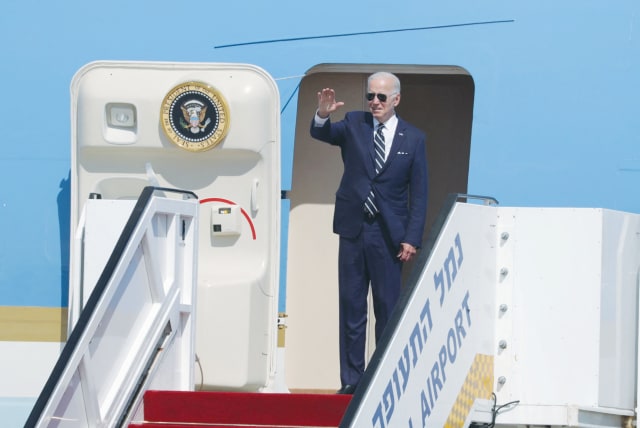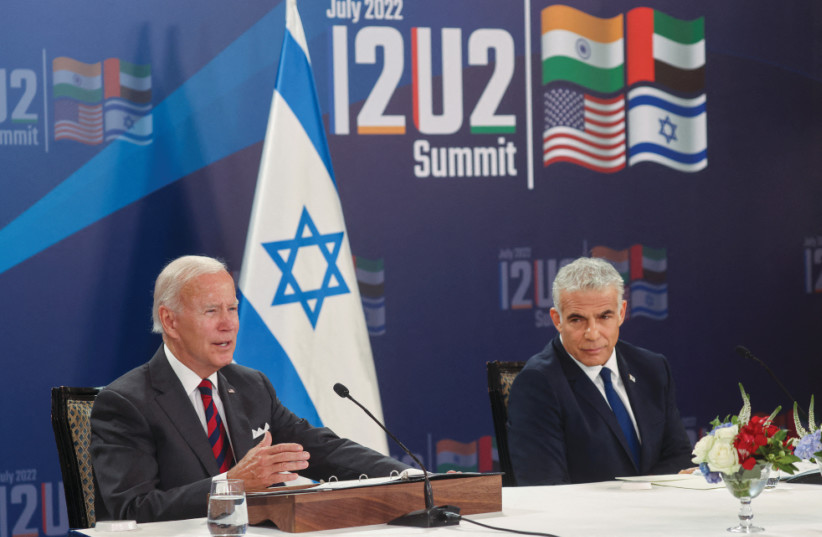Biden’s visit to Israel, Middle East in retrospect - opinion

From Israel-US ties, talks with the Saudis, recognizing the Iran threat and the Palestinian conflict to the anti-Israel elements in the Democratic Party.
US President Joe Biden’s visit to Israel, on the way to the more important Jeddah meeting, was a perfect lovefest on both sides, including the meetings with the alternate Prime Minister Yair Lapid and past and perhaps future prime minister Benjamin Netanyahu. Biden says what he thinks, and his friendship for Israel is genuine and proven even if there have been disagreements over the years on the Palestinian issue and especially on construction beyond the “Green Line.”
While the stopover in Jerusalem also served as a fig leaf to blunt the criticism in parts of the American public, and particularly in his party, over Biden’s decision to meet with Saudi Crown Prince Mohammed bin Salman, dictated by economic and geopolitical imperatives, including preventing China and Russia making further headway in the region – this does not detract from appreciating his intention to use the reset of relations between the US and Saudi Arabia also as a lever for advancing relations between Saudi Arabia and Israel.
The sides’ main objectives in Jeddah were clear: America realizing contrary to previous assessment, that the West as a whole needed Saudi oil following the Ukraine war in order to stop the inflationary spiral and lessen the threat of a global economic crisis – and Saudi Arabia and the United Arab Emirates seeking comprehensive and concrete political and military assurances against the threat from Iran. Biden wasn’t operating in a vacuum, as Netanyahu’s and Trump’s Abraham Accords had already paved the way and created certain facts, both visible and less so, including on security related matters and various Saudi-Israeli items.
Another aspect of the new reality is that the Biden administration has put the brakes on, or at least moderated, the policy of his predecessors Obama and Trump of gradually withdrawing from the Middle East and moving the pivot of the US’s main strategic activity towards the Far East. Though the direction is positive, all this will still be a slow and incremental process and among other things, there is no certainty that Saudi Arabia will significantly increase its oil production given the opposition of OPEC, headed by Saudi Arabia, of which Russia is an important member. With regards to the Saudi-Israeli equation, despite some important advances such as Israeli airlines being allowed to cross the Saudi airspace, Riyadh does not intend any time soon to fully normalize relations with Israel.
AND BACK to the local scene:
Biden and Lapid signed the much-vaunted “Jerusalem-US-Israel Strategic Partnership Joint Declaration,” defining relations between the countries. In diplomacy there are “important-unimportant agreements” and the Jerusalem Declaration is an example of this. While one should not disregard its symbolism, in practice almost everything in it reflects already existing facts and agreements, or on the other hand, realistically non-achievable aims, as for example on the Palestinian issue.
Ehud Barak too, in his first visit to Washington as prime minister, signed a rather bombastic document with president Clinton, though judging by its clauses, it mainly reflected the existing reality while others remained on paper.
One clause in the Jerusalem Declaration, of possibly more important concrete value, emphasizes the US “commitment never to allow Iran to acquire a nuclear weapon,” and that it is “prepared to use all elements of its national power to ensure that outcome – but without explicitly stating the military option, as Netanyahu had proposed in his conversation with the president. In any case, this commitment could have been more convincing if the US hadn’t continued its efforts to renew the nuclear agreement with Iran.
The promise “to work together with other partners to confront Iran’s aggression and destabilizing activities, whether advanced directly or through proxies and terrorist organizations such as Hezbollah, Hamas and Palestinian Islamic Jihad” however, could be of greater importance – especially if Washington interprets it as granting diplomatic and practical backing to Israel in the international arena in its actions against Iran and the terrorist organizations.
Biden several times repeated the by now shop-worn mantra of a “democratic Palestinian State existing in peace alongside Israel,” also adding the term “continuous” (a practical impossibility, given Israel’s security needs and the Gaza separation). When president George W. Bush’s then-secretary of state Colin Powell mentioned “continuity” to newly-elected Israel’s prime minister Sharon, the latter suggested that this would be achieved by tunnels.
Though Israel ultimately separating from the Palestinians may be advisable for a number of reasons, establishing a Palestinian state in parts of the “West Bank” under current circumstances is not – nor has it anything to do with advancing peace.
On the contrary, establishing a certain to be Hamas- or ISIS-dominated terrorist state right on Israel’s border is a prescription for incessant wars and bloodshed. As Biden himself has stated in the past, the only way to advance peace between Israel and its neighbors is their coming to terms ideologically and practically with the Jewish people’s right to a state of its own in its homeland.
Perhaps one of the most important benefits of Biden’s visit to Israel, was his signaling to the anti-Israel elements – and in part antisemitic wing of the Democratic Party which supports BDS, opposes military aid to Israel and calls for sanctions against it – that the moderate majority in the Democratic Party will be steadfast in its support of the Jewish State.
The writer, also a former MK, served as ambassador to the US from 1990-1993 and 1998-2000.
Jerusalem Post Store
`; document.getElementById("linkPremium").innerHTML = cont; var divWithLink = document.getElementById("premium-link"); if (divWithLink !== null && divWithLink !== 'undefined') { divWithLink.style.border = "solid 1px #cb0f3e"; divWithLink.style.textAlign = "center"; divWithLink.style.marginBottom = "15px"; divWithLink.style.marginTop = "15px"; divWithLink.style.width = "100%"; divWithLink.style.backgroundColor = "#122952"; divWithLink.style.color = "#ffffff"; divWithLink.style.lineHeight = "1.5"; } } (function (v, i) { });

